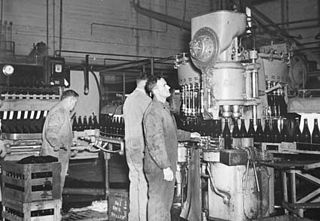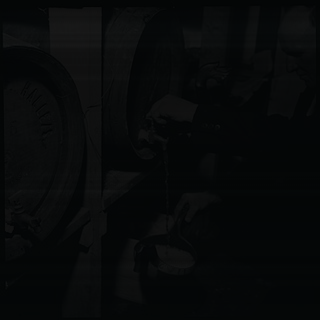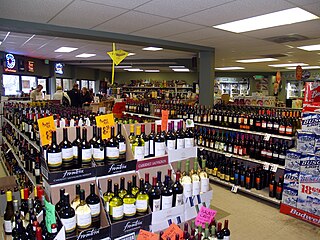
A bar, also known as a saloon, a tavern or tippling house, or sometimes as a pub or club, is a retail business establishment that serves alcoholic beverages, such as beer, wine, liquor, cocktails, and other beverages such as mineral water and soft drinks. Bars often also sell snack foods, such as crisps or peanuts, for consumption on their premises. Some types of bars, such as pubs, may also serve food from a restaurant menu. The term "bar" refers to the countertop where drinks are prepared and served, and by extension to the overall premises.

Systembolaget, colloquially known as systemet or bolaget, is a government-owned chain of liquor stores in Sweden. It is the only retail store allowed to sell alcoholic beverages that contain more than 3.5% alcohol by volume. Systembolaget acts as a portal for private companies selling alcohol on the Swedish market and currently (2022) it represents 1200 vendors ranging from small local breweries to large scale importers and multinational companies, selling products from a total of over 5000 producers from all over the world.

The Liquor Control Board of Ontario (LCBO) is a Crown corporation that retails and distributes alcoholic beverages throughout the Canadian province of Ontario. It is accountable to the Legislative Assembly through the minister of finance. It was established in 1927 by the government of Premier George Howard Ferguson to sell liquor, wine, and beer. Such sales were banned outright in 1916 as part of prohibition in Canada. The creation of the LCBO marked an easing of the province's temperance regime. By September 2017, the LCBO was operating 651 liquor stores.

Brewers Retail Inc., doing business as The Beer Store, is a privately-owned chain of retail outlets selling beer and other malt beverages in the province of Ontario, Canada.

A beer bottle is a bottle designed as a container for beer. Such designs vary greatly in size and shape, but the glass commonly is brown or green to reduce spoilage from light, especially ultraviolet.
The alcohol licensing laws of the United Kingdom regulate the sale and consumption of alcohol, with separate legislation for England, Wales, Northern Ireland and Scotland being passed, as necessary, by the UK parliament, the Senedd in Wales, the Northern Ireland Assembly, and the Scottish Parliament respectively.

Beer has been brewed in England for thousands of years. As a beer brewing country, it is known for top fermented cask beer which finishes maturing in the cellar of the pub rather than at the brewery and is served with only natural carbonation.

Beer arrived in Australia at the beginning of British colonisation. In 2004 Australia was ranked fourth internationally in per capita beer consumption, at around 110 litres per year; although, the nation ranked considerably lower in a World Health Organization report of alcohol consumption per capita of 12.2 litres. Lager is by far the most popular type of beer consumed in Australia.

Beer in Norway has a long history, stretching back more than a millennium. Until some 200 years ago, most farms where it was possible to grow grain south of the Arctic Circle, brewed their own beer. From the early 20th century brewing was industrialized and home brewing was restricted. Significant consolidation in the brewing sector reduced the number of major breweries to just a handful. With the exception of the farmhouse ales, most beer styles brewed in Norway trace their ancestry to central Europe.

A liquor store is a retail shop that predominantly sells prepackaged liquors – typically in bottles – usually intended to be consumed off the store's premises. Depending on region and local idiom, they may also be called an off-licence, off-sale, bottle shop / bottle-o liquor store (US) or other similar terms. Very limited number of jurisdictions have an alcohol monopoly. In US states that are alcoholic beverage control (ABC) states, the term ABC store may be used.
Alcoholic beverage control states, generally called control states, less often ABC states, are 17 states in the United States that, as of 2016, have state monopoly over the wholesaling or retailing of some or all categories of alcoholic beverages, such as beer, wine, and distilled spirits.

The Alberta Gaming, Liquor and Cannabis Commission (AGLC) is an agency of the government of the Canadian province of Alberta, and regulates alcoholic beverages, recreational cannabis, and gaming-related activities. References to cannabis were added to AGLC's name and governing legislation as cannabis in Canada moved towards legalization in 2018. AGLC was created in 1996 as the Alberta Gaming and Liquor Commission by combining the responsibilities and operations of the Alberta Liquor Control Board (ALCB), Alberta Lotteries, the Alberta Gaming Commission, Alberta Lotteries and Gaming and the Gaming Control Branch. The current Chief Executive Officer as of 2020 is Kandice Machado.
The Washington State Liquor and Cannabis Board, formerly the Washington State Liquor Control Board, is an administrative agency of the State of Washington. The Liquor and Cannabis Board is part of the executive branch and reports to the Governor. The board's primary function is the licensing of on and off premises establishments which sell any type of alcohol, and the enforcement and education of the state's alcohol, tobacco, and cannabis laws.
A liquor license is a governmentally issued permit to sell, manufacture, store, or otherwise use alcoholic beverages.

An Australian pub or hotel is a public house or pub for short, in Australia, and is an establishment licensed to serve alcoholic drinks for consumption on the premises. They may also provide other services, such as entertainment, meals and basic accommodation.

Alcoholic drinks in Sweden are as common as in most of the western world. Sweden is historically part of the vodka belt, with high consumption of distilled drinks and binge drinking, but during the later half of the 20th century, habits are more harmonized with western Europe, with increasing popularity of wine and weekday drinking. Wine is now also grown and produced in several parts of Sweden and the southernmost region of Skåne is turning into a hub experiencing a strong growth in number of active vineyards.

The alcohol laws of Pennsylvania contain many peculiarities not found in other states, and are considered some of the strictest regulations in the United States.

Alcohol has been consumed in New Zealand since the arrival of Europeans. The most popular alcoholic beverage is beer. The legal age to purchase alcohol is 18.
Blue laws, also known as Sunday laws, are laws that restrict or ban some or all activities on specified days, particularly to promote the observance of a day of rest. Such laws may restrict shopping or ban sale of certain items on specific days. Blue laws are enforced in parts of the United States and Canada as well as some European countries, particularly in Austria, Germany, Switzerland, and Norway, keeping most stores closed on Sundays.

A growler (US) is a glass, ceramic, or stainless steel bottle used to transport draft beer. They are commonly sold at breweries and brewpubs as a means to sell take-out craft beer. Rarely, beers are bottled in growlers for retail sale. The significant growth of craft breweries and the growing popularity of home brewing has also led to an emerging market for the sale of collectible growlers. Some U.S. grocery stores, convenience stores, bars and restaurants have growler filling stations.
















